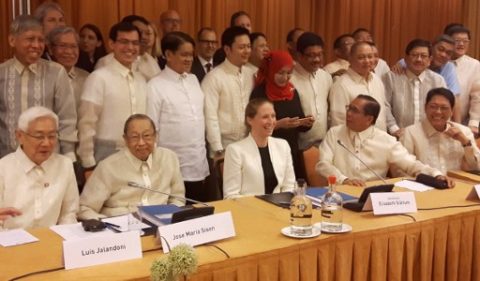
The meeting is the fourth round of talks between the NDF and Manila, which have been on and off for 30 years but were restarted by President Rodrigo Duterte after he took office last June. / AFP PHOTO / Sophie MIGNON
NOORDWIJK AAN ZEE, Netherlands (AFP) — Philippine government officials Monday launched a new round of talks with communist rebels aiming to hammer out an interim ceasefire in moves to end one of the world’s longest insurgencies.
The talks, which got under way in The Netherlands, are due to last until Friday and are the fourth round between the National Democratic Front and Manila.
“We welcome the openness of the National Democratic Front of the Philippines (NDFP) to undertake a forging in this round of talks of an agreement on (a) joint interim ceasefire,” Philippine government negotiator Silvestre Bello told a press conference.
The interim truce will “accompany our peace negotiations throughout,” he said, adding it will march “in step with the discussion of the socio-economic reforms that will address the root causes of armed conflict.”
The conflict erupted in 1968 in the impoverished country and peace negotiations have been on and off for about 30 years. They were kick-started again by President Rodrigo Duterte after he took office last June.
The NDFP is made up of several groups, the most prominent of which is the Communist Party of the Philippines, whose guerrilla unit is the 4,000-strong New People’s Army (NPA).
Norway had coaxed the two sides back to the negotiating table in August. But little progress has been made in the three previous rounds.
Originally due to be held in Oslo, the talks were moved to the western Dutch town of Noordwijk aan Zee, about 70 kilometers (45 miles) from Utrecht where several rebel leaders live in exile.
The founder of the Communist Party, Jose Maria Sison, who lives in Utrecht, is recovering from a bout of ill-health.
“The negotiations are necessary to address the roots of the armed conflict and to agree on a social economic political and constitutional reform in order to lay the basis for a just and lasting peace,” he told reporters.
The conflict has left some 30,000 people dead, according to the Philippine army. But the hope is now to reach a peace deal by the end of 2017.
The talks were delayed by a day, when Duterte said not all the conditions had been met. He has insisted the government will not recognize any territorial claims made by the rebels and that all prisoners should be released.
He also called for clear parameters for the ceasefire.
The rebels, inspired by China’s former leader Mao Zedong, have called for land reforms to free millions of landless Filipino farm hands from what they call “semi-feudal” bondage.







